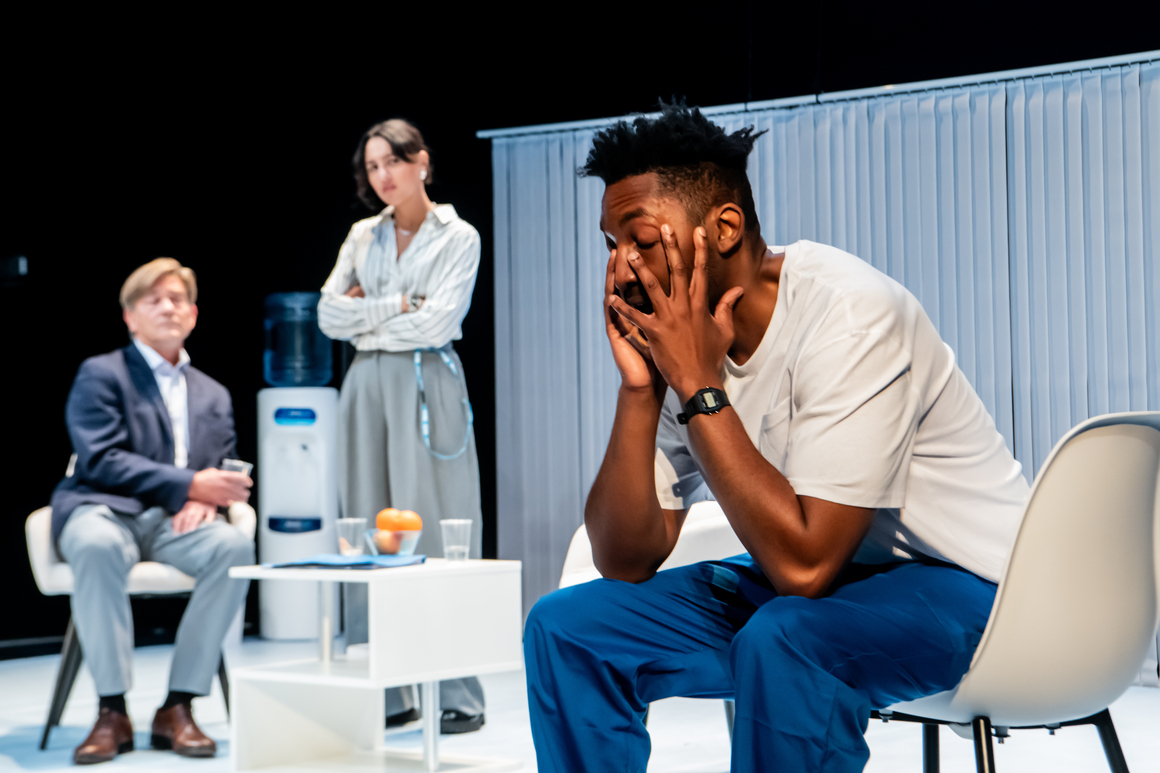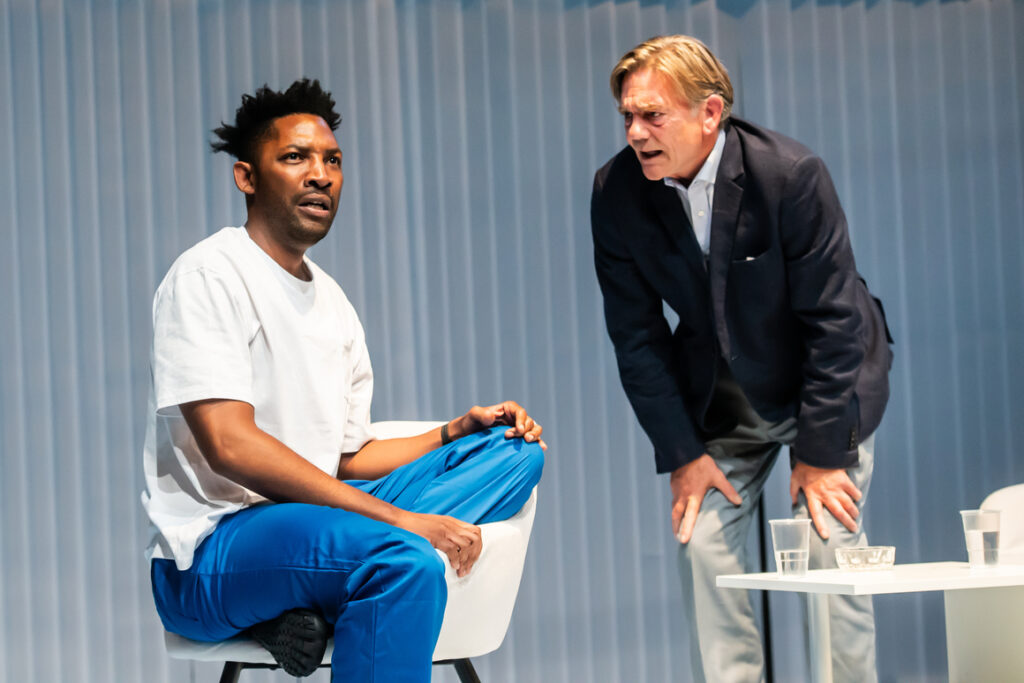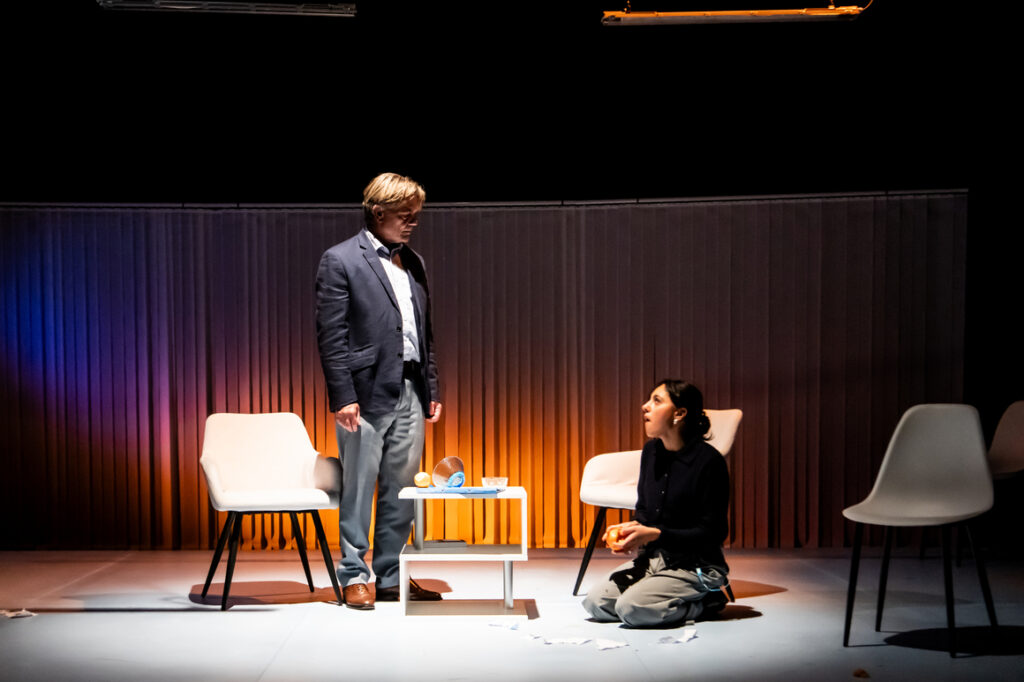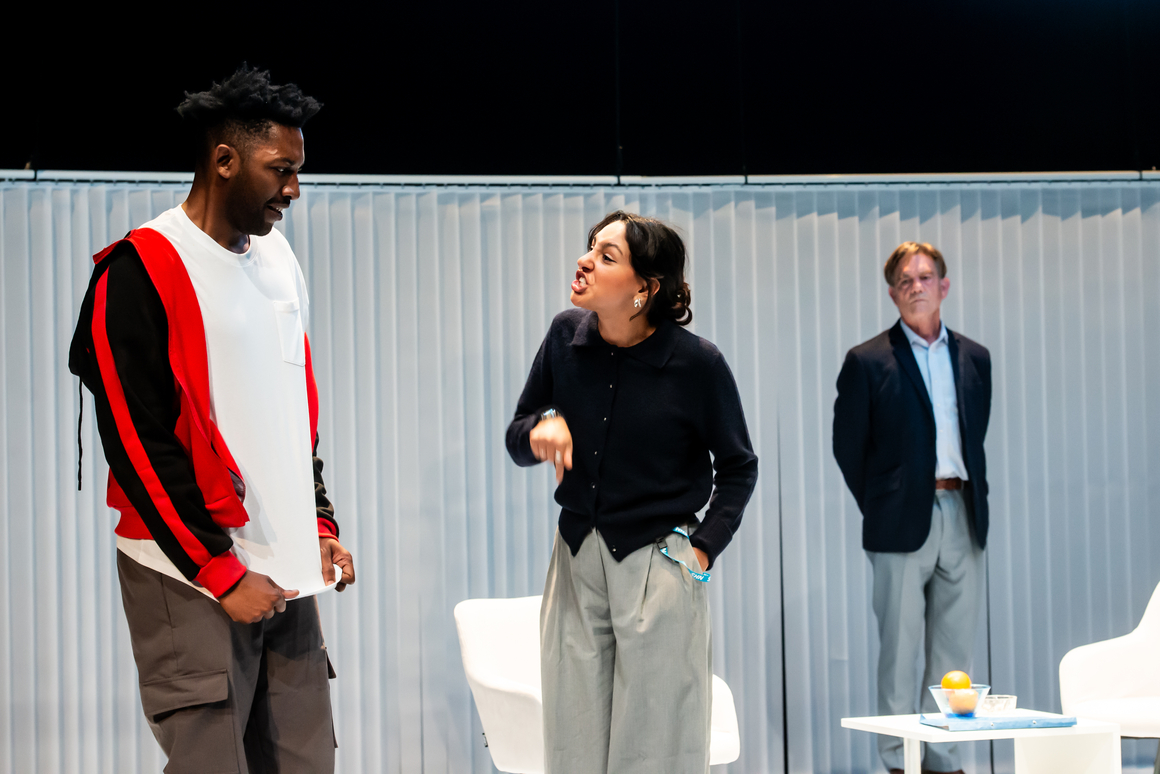Review by Simon Jenner, October 8 2025
★★★★(★)
25 years on it’s astonishing how this play hasn’t dated, save in a few cultural references. This revival of Joe Penhall’s 2000 Blue/Orange directed by artistic director James Hadrill at Greenwich Theatre till October 25 receives an imaginatively rethought production. References are kept, even to awkwardness; and the maths tells us it’s still 2000, though it could otherwise be 2025. Terms like BPD were coming into vogue, which flourish now as fashion accessories.
Hadrill radically re-genders indeed renames a doctor, so their ethnicity too is altered. This heightens and enriches conflict, though some subtleties are lost. Other references indeed remain intact, slightly awkwardly. A whole backstory of rugby and Welsh Rarebit is rescued (just) by neat appropriation of a gay stereotype. The dynamics of the play shift significantly. It’s also split from its 90-minute straight-through format to one lasting two hours 25 minutes with interval. It doesn’t alter the intensity (surprisingly) but does alter our response to Penhall’s best-known work, though he’s now also famed for screenplays, Sunny Afternoon and The Constituent.

John Michie, Rhiane Barreto and Matthew Morrison. Photo Credit: Lidia Crisafulli
Christopher, a young Black man, is being assessed by registrar psychiatrist Dr Rubina Farooqui (Rhianne Barreto) for release. Originally they’re both 24, and here they’re still similarly aged, still seeking different kinds of approval. Farooqui, who’s on probation, admitted Christopher twenty-eight days back and thinks he’s not simply Borderline Personality Disorder or BPD. That is, the no-man’s land of hurting others (psychotic) or yourself (neurotic). Farooqui thinks Christopher’s nearing that misunderstood world now labelled schizo-affective. It means Christopher will be dosed up, stumbling through revolving doors the rest of his life. Farooqui, earnest and awkward, is desperately anxious to do right; she’s also judgementally bigoted. Though here in Barreto’s performance that’s initially softened.
Enter urbane quote-reaching consultant Dr Robert Smith, strutted with hauteur, menacing urbanity and cunning by John Michie. Smith, Farooqui’s supervisor, wants Christopher out, to free up a bed, but more importantly, to fulfil an ambition. Smith’s stepping after R D Laing (‘I was quoting Laing’ he ripostes) and sees Christopher as a means of completing his book, so he too can assume a professorship and mantle of greatness. Even he seeks approval.
Alluding to French surrealist poet Paul Eluard’s blue orange, Smith disingenuously suggests Christopher’s persistence in seeing oranges as blue might be a cultural memory. It isn’t. Michie dissimulates culture like after-dinner mints as Christopher’s birthright whilst believing no such thing. Matthew Morrison’s Christopher, with the unerring plausibility of some schizo-affectives, brilliantly rationalises how he’s the son of Idi Amin, his Zaire mother resident in Uganda. Later he clinches Mohammad Ali as father via The Rumble in the Jungle.
Morrison’s charm doesn’t disguise fault-lines that snap open: snatching a press-cutting back from Michie’s Dr Robert – surely a Beatles joke on their eponymous song with the lines: “if you’re down he’ll pick you up/Doctor Robert.” Smith’s about to pocket it; which says everything about cultural appropriation.

Matthew Morrison and John Michie. Photo Credit: Lidia Crisafulli
Farooqui realizes this and in his blundering places tripwires for herself. In a closed interview with Christopher, Smith scrambles self-derogatory demotics that Christopher’s adopted – innocently reminded by Farooqui. Farooqui’s reminder is a gift to Smith.
Christopher’s a site of ego-conflict, high-mindedness, wrong diagnosis. When Christopher changes his mind, Smith gets him alone to bully him to change back; planting the idea that Farooqui is racist. In reality, Smith’s ethnocentric projection of why so many Black men come through the system is deeply racist. He cajoles Christopher, an African, to listen to Caribbean reggae.
In this thrilling production, it’s almost that all three protagonists start sane and all end mad.
Morrison’s Christopher is edged with danger. In a breathtaking display, his jocularity flips to panicky near violence followed by numb withdrawal. Terrified implosion reeks off Morrison, twisted by Michie’s Smith and cajoled, eventually abused by Barreto’s Farooqui. Both by pleading with him for their lives are beginning to destroy his. Even this doesn’t do justice to Morrison’s phenomenal disassociation speeches, lariats of speed-dial language. In this production he’s matched to a degree by Barreto’s and Michie’s overlapping each other and Morrison even more intensely than previously.
Barreto’s Farooqui re-genders the original junior, previously played as a puritanical Scot. This is a revelation. Farooqui’s even more vulnerable, prone to extremes as Smith’s torturing extends by proxy through Christopher. Barreto’s Farooqui isn’t without a steely vein of self-righteous resilience, even when she fawns: a hapless pupil, cravenly ambitious yet in petulant revolt. You wonder if her high-minded stance has been that all along. Not quite, but no-one’s identity is stable; which is psychiatry’s point. Barreto’s collapse is very different to how the play usually works, and exhausting too by the end. You wonder if this redrawn character is capable of countering Smith by then. Dynamics are more extreme, the conflict bordering (like BPD), on violence.
Jana Lakatos’s design follows Penhall’s prescription and underscores a clinical chill in whites. Chairs, table, water filter, oranges are (like patients) tightly contained with minimal backdrop, maximising claustrophobia. There’s little wiggle-room, though the Young Vic’s superb 2016 production directed by Matthew Xia was enhanced by Jeremy Herbert’s peeled oranges strewing various grim passages to the seats, as if you could nose your way there. That breaks containment and makes us complicit. Brilliant, if showy. Lakatos and Hadrill go for on-stage torn report-paper, sprawled with upended chairs. The god of carnage is more convincing this way. Henry Slater’s lighting though cleverly flickers with four overhead strip-lights occasionally on the blink, suggesting an NHS even more run down than in 2000. There’s dark punctuating each scene.
Smith’s breezy ruthlessness knows no bounds as Michie purrs: “That’s not how it works.” Though not everything’s stacked on Smith’s side. Farooqui – so crushed in this production you can’t imagine a way back – holds a card and a revelation. Just. The stage cries a white-strewn havoc of paper and chairs by the end. No-one takes prisoners, but Christopher’s already a hostage in this absorbing, still utterly relevant dramatization of the abuse we offer the abused.
John Michie and Rhiane Barreto. Photo Credit:Lidia Crisafulli



